译林版(2020) 选择性必修第一册 Unit 2 The Universal Language Grammar and usage课件(共32张PPT)
文档属性
| 名称 | 译林版(2020) 选择性必修第一册 Unit 2 The Universal Language Grammar and usage课件(共32张PPT) | 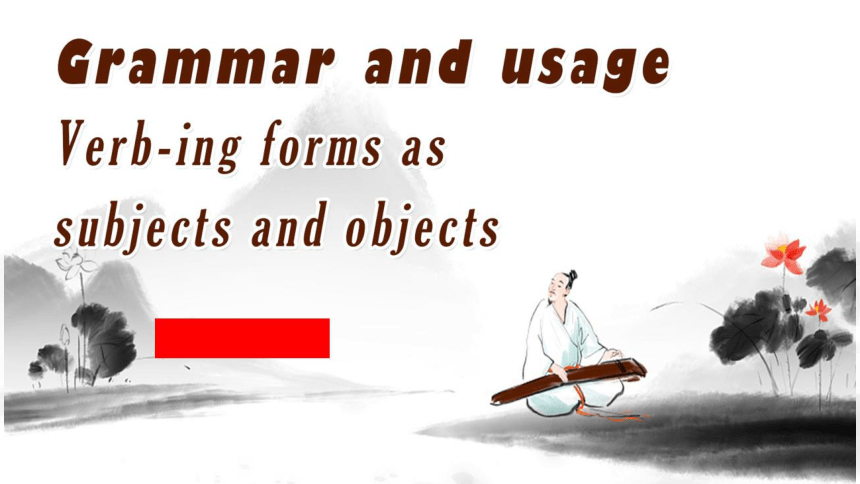 | |
| 格式 | zip | ||
| 文件大小 | 1.9MB | ||
| 资源类型 | 教案 | ||
| 版本资源 | 牛津译林版(2019) | ||
| 科目 | 英语 | ||
| 更新时间 | 2022-06-23 08:41:37 | ||
图片预览


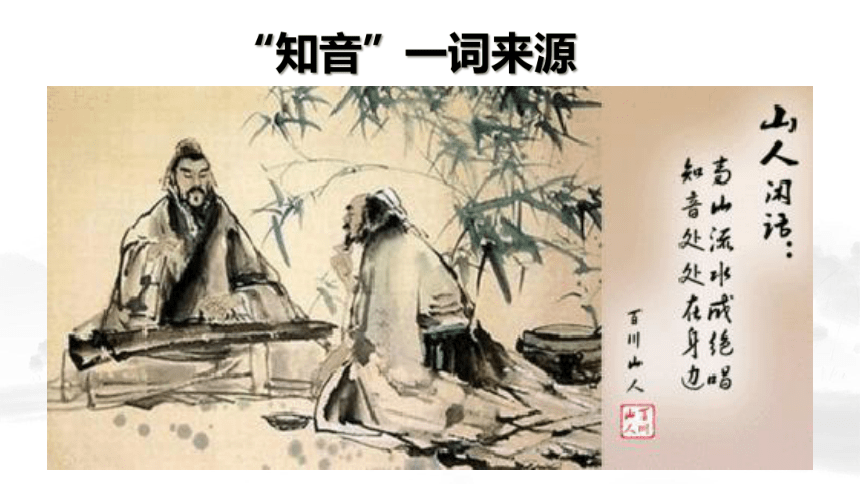
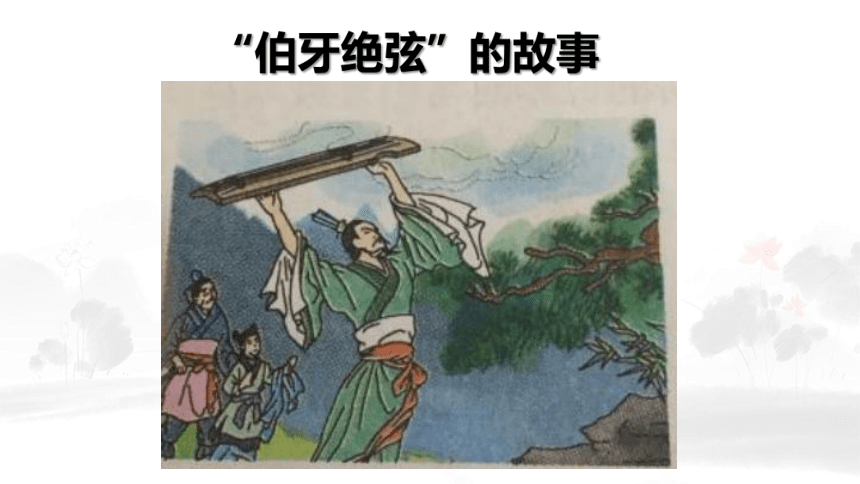
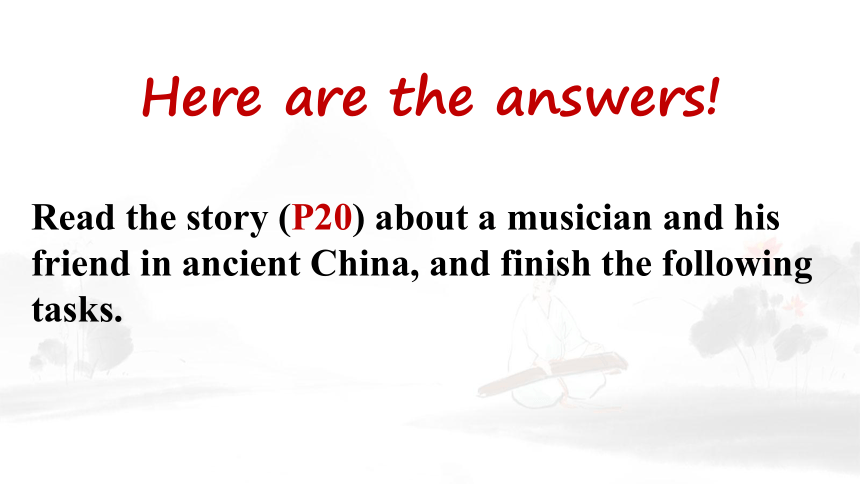

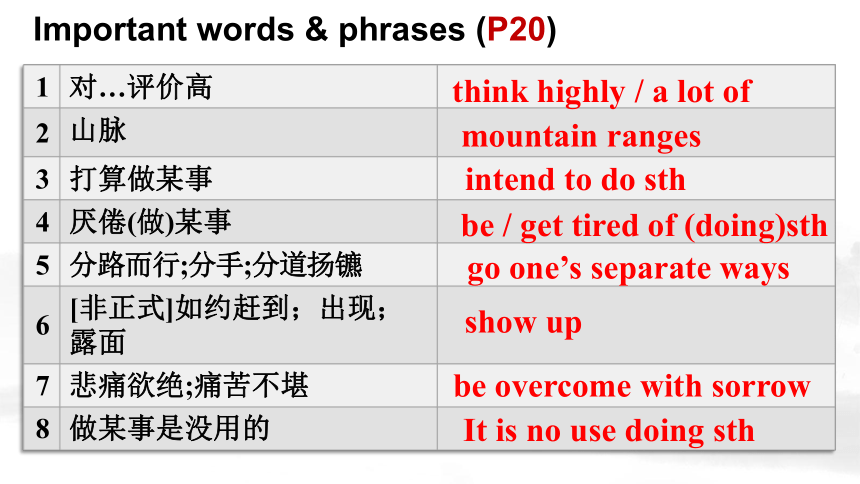
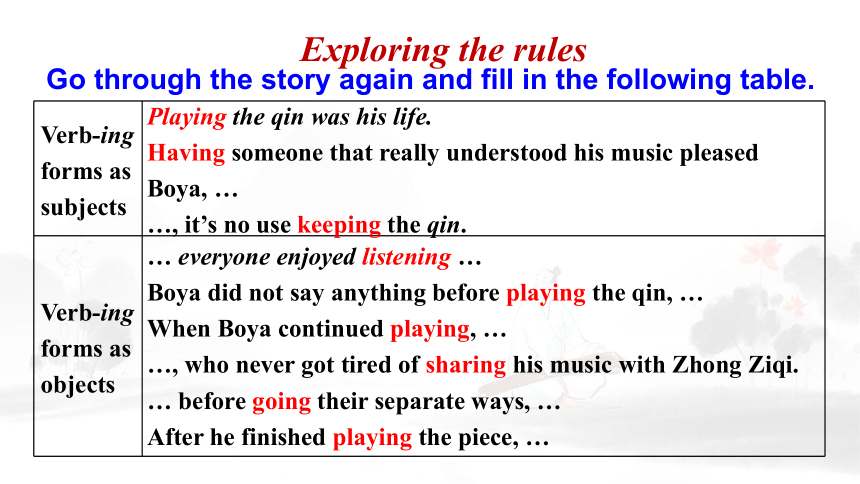
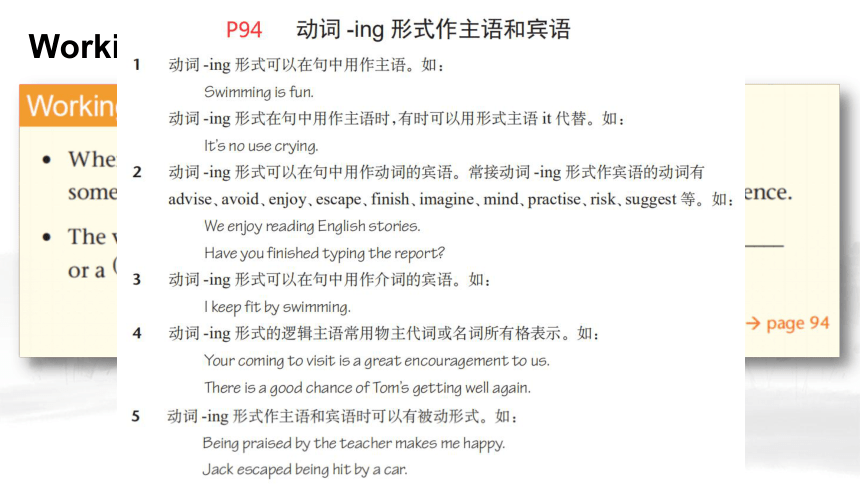

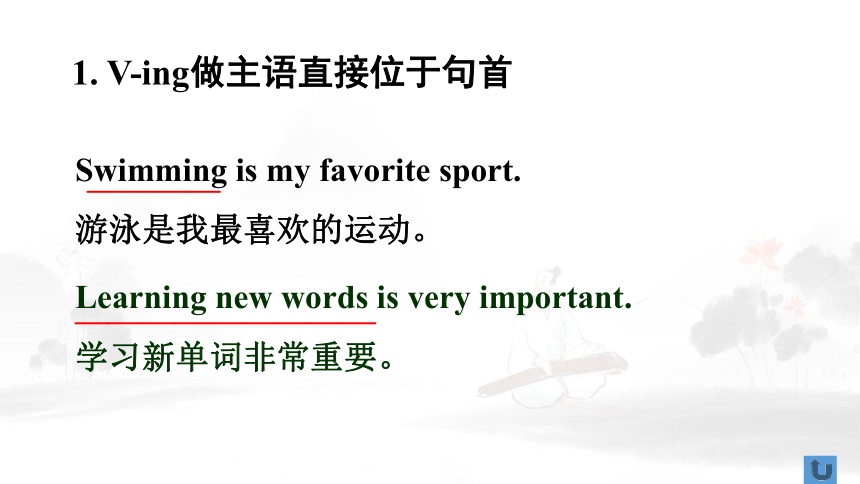

文档简介
(共32张PPT)
中国十大古曲之一
“知音”一词来源
“伯牙绝弦”的故事
Here are the answers!
Read the story (P20) about a musician and his friend in ancient China, and finish the following tasks.
Fill in the following table.
When in China’s (1) ________________________________________
Who Boya, (2) ____________________
Zhong Ziqi, Boya’s audience and friend
What happened Boya played the qin very well, but he believed no one could
(3) ___________________ until he met Zhong Ziqi.
Zhong was able to recognize the image in Boya’s piece of music: (4) ____________________________________.
They became great friends and agreed to meet the next year.
(5) ___________________ because Zhong Ziqi, the only person that could understand his music was gone.
Spring and Autumn and Warring States periods
a master of the qin
understand his music
High Mountains and Flowing Water
Boya destroyed his qin
1 对…评价高
2 山脉
3 打算做某事
4 厌倦(做)某事
5 分路而行;分手;分道扬镳
6 [非正式]如约赶到;出现;露面
7 悲痛欲绝;痛苦不堪
8 做某事是没用的
think highly / a lot of
intend to do sth
go one’s separate ways
show up
be overcome with sorrow
Important words & phrases (P20)
mountain ranges
be / get tired of (doing)sth
It is no use doing sth
Exploring the rules
Verb-ing forms as subjects
Verb-ing forms as objects
Playing the qin was his life.
Having someone that really understood his music pleased Boya, …
…, it’s no use keeping the qin.
… everyone enjoyed listening …
Boya did not say anything before playing the qin, …
When Boya continued playing, …
…, who never got tired of sharing his music with Zhong Ziqi.
… before going their separate ways, …
After he finished playing the piece, …
Go through the story again and fill in the following table.
Working out the rules (P20)
verb
preposition
一、动名词做主语
1. V-ing作主语直接置于句首
2. V-ing做主语置于句末,用it做形式主语
3. 常用V-ing形式做主语的句型
4. V-ing形式和to do 不定式做主语时的区别
1. V-ing做主语直接位于句首
Swimming is my favorite sport.
游泳是我最喜欢的运动。
Learning new words is very important.
学习新单词非常重要。
————
—————————
★ 2. 动词-ing形式作主语,表示一般或抽象的
习惯性行为,谓语动词用单数。
e.g. Reading aloud is very important for us to learn a
foreign language.
Going to bed early and getting up early is
considered to be a good habit.
2. V-ing做主语置于句末,用it做形式主语
It is no use waiting here.在这儿等是没用的。(It为形式主语,waiting here为真正的主语)
It is no good smoking. 吸烟是没有好处的。(It为形式主语,smoking为真正的主语)
Waiting here is no use.
Smoking is no good.
3. 常用V-ing形式做主语的句型
It is/ was a waste of time doing...
做...是浪费时间的。
It is/ was no good/ use doing...
做...是没有好处/用处的。
It is a waste of time sitting in front of the television all day.
Sitting in front of the television all day is a waste of time .
It is useless telephoning him.
Telephoning him is useless.
It is/ was worth/ worthwhile doing...
做...是值得的。
It is/ was hardly worth doing...
做...是不值得的。
It was worthwhile searching for him.
Searching for him was worthwhile.
It is hardly worth helping him.
Helping him is hardly worth.
It is/ was useless doing...
做...是没有用处的。
There is/ was no point/sense (in) doing...
做...没意义。
There is no point/sense (in) trying to stop him.
It is useless doing exercise.
Doing exercise is useless.
4. V-ing形式和to do 不定式做主语时的区别
1)作主语时,不定式与动名词一般可以通用。
2)动名词表示的动作通常是一个泛指的动作,表示一种普遍性的事情或一种经验和体会,一般用动名词作主语。
3)不定式则通常表示具体的动作(指句中有具体的时间、频率、地点、方式状语)或将来的动作,一般用不定式作主语。
Singing is my hobby, and to sing
on my friend’s birthday party is an honor.
唱歌是我的爱好,在朋友的生日宴会上唱歌是我的荣幸。
______
______
singing 表泛指行为唱歌
to sing 表特指动作唱歌
————————————
on my friend's birthday party 具体的时间状语
No smoking
No parking
No swimming
=No smoking is allowed (here).
V-ing用于布告形式
的省略结构中。
动名词常用于简短的禁令中:
二、动名词做宾语
1. V-ing作动词、介词的宾语
2. 动词接v-ing或to do 做宾语的区别
3. v-ing做真正宾语,it做形式宾语的句型
4. V-ing 形式的复合结构
1. V-ing 做动词的宾语
某些动词和动词短语后只能用动名词作宾语,常见的有:
admit, appreciate, advise, allow, permit, avoid, consider, enjoy, finish, imagine, keep, mind,risk, miss,delay, practise, suggest, give up, keep on, set about, feel like 等。
①常用的带介词 to 短语有:
lead to /look forward to/devote… to /pay attention to/
be(get)used to/get down to (开始认真干)/object to/
be opposed to(反对)/ be addicted to/contribute to/
stick to/ turn to/ refer to…
e.g.
My father is used to going to bed late and getting up very early.
I’m looking forward to receiving your reply.
②其他:
can’t help (情不自禁)/insist on/put off(推迟)/
can’t bear/ stand(不能忍受/depend on /be fond of/
be worth/ have difficulty/trouble in doing/ succeed in/ be busy in…
mean to do 打算,意欲做...
mean doing 意味着...
can't help to do 不能帮着做...
can't help doing 禁不住做...
He is so busy that he can't help to finish the work.
He can’t help crying at the bad news.
I didn't mean to do that.
Missing a bus in London means waiting for another hour.
2. 动词接v-ing或to do 做宾语,区别很大的有
try to do 尽力去做...
try doing 试着去做...
stop to do 停下来去做另一件事
stop doing 停止正在做的事情(不做某事)
He has the ability but he didn't try to do it.
Why didn't you try riding a bike to go to school
remember/ regret/ forget to do
记着/遗憾/忘记要做...
remember/ regret/ forget doing 记着/遗憾/忘记已做了...
I remember to mail the letter but forget buying the stamp.
我记得去寄信可忘了已买邮票了。
★ 动词-ing形式用在动词need, want, require等后表示“需要”时,用动词-ing形式的主动形式或者用不定式的被动式表示被动意义。
e.g. The carpet really wants cleaning.
= The carpet really wants to be cleaned.
★注意:
在allow, advise, forbid, permit后直接跟动名词作宾语,如果有名词或代词作宾语,则构成“allow/advise/forbid/permit +名词/代词+不定式(宾语补足语)”之形式。如:
We don't allow smoking.
We don't allow anybody to smoke.
I will permit doing so.
I will permit him ________.
to do so
3. V-ing做真正宾语,it 做形式宾语的句型
主语+ + it + doing
think
consider
find
feel like
useless
no use
no good
...
I found it useless arguing with him.
I found arguing with him useless.
用 it 做形式宾语,真正的宾语是V-ing短语,其结构如下:
三、V-ing形式的复合结构
带有逻辑主语的V-ing称为V-ing的复合结构。
当V-ing的逻辑主语与句子的主语不一致时,要在
V-ing之前加上物主代词或名词所有格,这样便构成了V-ing的复合结构。其中,物主代词和名词所有格就是逻辑上的主语,V-ing是逻辑上的谓语。
being late made my teacher angry.
迟到使得老师很生气。
My
我
Examples:
Do you mind my closing the window
close the window
关窗户这个动作的逻辑主语是我
What I need now is his apologizing to me.
= His apologizing to me is what I need now.
apologize to me的逻辑主语是他
中国十大古曲之一
“知音”一词来源
“伯牙绝弦”的故事
Here are the answers!
Read the story (P20) about a musician and his friend in ancient China, and finish the following tasks.
Fill in the following table.
When in China’s (1) ________________________________________
Who Boya, (2) ____________________
Zhong Ziqi, Boya’s audience and friend
What happened Boya played the qin very well, but he believed no one could
(3) ___________________ until he met Zhong Ziqi.
Zhong was able to recognize the image in Boya’s piece of music: (4) ____________________________________.
They became great friends and agreed to meet the next year.
(5) ___________________ because Zhong Ziqi, the only person that could understand his music was gone.
Spring and Autumn and Warring States periods
a master of the qin
understand his music
High Mountains and Flowing Water
Boya destroyed his qin
1 对…评价高
2 山脉
3 打算做某事
4 厌倦(做)某事
5 分路而行;分手;分道扬镳
6 [非正式]如约赶到;出现;露面
7 悲痛欲绝;痛苦不堪
8 做某事是没用的
think highly / a lot of
intend to do sth
go one’s separate ways
show up
be overcome with sorrow
Important words & phrases (P20)
mountain ranges
be / get tired of (doing)sth
It is no use doing sth
Exploring the rules
Verb-ing forms as subjects
Verb-ing forms as objects
Playing the qin was his life.
Having someone that really understood his music pleased Boya, …
…, it’s no use keeping the qin.
… everyone enjoyed listening …
Boya did not say anything before playing the qin, …
When Boya continued playing, …
…, who never got tired of sharing his music with Zhong Ziqi.
… before going their separate ways, …
After he finished playing the piece, …
Go through the story again and fill in the following table.
Working out the rules (P20)
verb
preposition
一、动名词做主语
1. V-ing作主语直接置于句首
2. V-ing做主语置于句末,用it做形式主语
3. 常用V-ing形式做主语的句型
4. V-ing形式和to do 不定式做主语时的区别
1. V-ing做主语直接位于句首
Swimming is my favorite sport.
游泳是我最喜欢的运动。
Learning new words is very important.
学习新单词非常重要。
————
—————————
★ 2. 动词-ing形式作主语,表示一般或抽象的
习惯性行为,谓语动词用单数。
e.g. Reading aloud is very important for us to learn a
foreign language.
Going to bed early and getting up early is
considered to be a good habit.
2. V-ing做主语置于句末,用it做形式主语
It is no use waiting here.在这儿等是没用的。(It为形式主语,waiting here为真正的主语)
It is no good smoking. 吸烟是没有好处的。(It为形式主语,smoking为真正的主语)
Waiting here is no use.
Smoking is no good.
3. 常用V-ing形式做主语的句型
It is/ was a waste of time doing...
做...是浪费时间的。
It is/ was no good/ use doing...
做...是没有好处/用处的。
It is a waste of time sitting in front of the television all day.
Sitting in front of the television all day is a waste of time .
It is useless telephoning him.
Telephoning him is useless.
It is/ was worth/ worthwhile doing...
做...是值得的。
It is/ was hardly worth doing...
做...是不值得的。
It was worthwhile searching for him.
Searching for him was worthwhile.
It is hardly worth helping him.
Helping him is hardly worth.
It is/ was useless doing...
做...是没有用处的。
There is/ was no point/sense (in) doing...
做...没意义。
There is no point/sense (in) trying to stop him.
It is useless doing exercise.
Doing exercise is useless.
4. V-ing形式和to do 不定式做主语时的区别
1)作主语时,不定式与动名词一般可以通用。
2)动名词表示的动作通常是一个泛指的动作,表示一种普遍性的事情或一种经验和体会,一般用动名词作主语。
3)不定式则通常表示具体的动作(指句中有具体的时间、频率、地点、方式状语)或将来的动作,一般用不定式作主语。
Singing is my hobby, and to sing
on my friend’s birthday party is an honor.
唱歌是我的爱好,在朋友的生日宴会上唱歌是我的荣幸。
______
______
singing 表泛指行为唱歌
to sing 表特指动作唱歌
————————————
on my friend's birthday party 具体的时间状语
No smoking
No parking
No swimming
=No smoking is allowed (here).
V-ing用于布告形式
的省略结构中。
动名词常用于简短的禁令中:
二、动名词做宾语
1. V-ing作动词、介词的宾语
2. 动词接v-ing或to do 做宾语的区别
3. v-ing做真正宾语,it做形式宾语的句型
4. V-ing 形式的复合结构
1. V-ing 做动词的宾语
某些动词和动词短语后只能用动名词作宾语,常见的有:
admit, appreciate, advise, allow, permit, avoid, consider, enjoy, finish, imagine, keep, mind,risk, miss,delay, practise, suggest, give up, keep on, set about, feel like 等。
①常用的带介词 to 短语有:
lead to /look forward to/devote… to /pay attention to/
be(get)used to/get down to (开始认真干)/object to/
be opposed to(反对)/ be addicted to/contribute to/
stick to/ turn to/ refer to…
e.g.
My father is used to going to bed late and getting up very early.
I’m looking forward to receiving your reply.
②其他:
can’t help (情不自禁)/insist on/put off(推迟)/
can’t bear/ stand(不能忍受/depend on /be fond of/
be worth/ have difficulty/trouble in doing/ succeed in/ be busy in…
mean to do 打算,意欲做...
mean doing 意味着...
can't help to do 不能帮着做...
can't help doing 禁不住做...
He is so busy that he can't help to finish the work.
He can’t help crying at the bad news.
I didn't mean to do that.
Missing a bus in London means waiting for another hour.
2. 动词接v-ing或to do 做宾语,区别很大的有
try to do 尽力去做...
try doing 试着去做...
stop to do 停下来去做另一件事
stop doing 停止正在做的事情(不做某事)
He has the ability but he didn't try to do it.
Why didn't you try riding a bike to go to school
remember/ regret/ forget to do
记着/遗憾/忘记要做...
remember/ regret/ forget doing 记着/遗憾/忘记已做了...
I remember to mail the letter but forget buying the stamp.
我记得去寄信可忘了已买邮票了。
★ 动词-ing形式用在动词need, want, require等后表示“需要”时,用动词-ing形式的主动形式或者用不定式的被动式表示被动意义。
e.g. The carpet really wants cleaning.
= The carpet really wants to be cleaned.
★注意:
在allow, advise, forbid, permit后直接跟动名词作宾语,如果有名词或代词作宾语,则构成“allow/advise/forbid/permit +名词/代词+不定式(宾语补足语)”之形式。如:
We don't allow smoking.
We don't allow anybody to smoke.
I will permit doing so.
I will permit him ________.
to do so
3. V-ing做真正宾语,it 做形式宾语的句型
主语+ + it + doing
think
consider
find
feel like
useless
no use
no good
...
I found it useless arguing with him.
I found arguing with him useless.
用 it 做形式宾语,真正的宾语是V-ing短语,其结构如下:
三、V-ing形式的复合结构
带有逻辑主语的V-ing称为V-ing的复合结构。
当V-ing的逻辑主语与句子的主语不一致时,要在
V-ing之前加上物主代词或名词所有格,这样便构成了V-ing的复合结构。其中,物主代词和名词所有格就是逻辑上的主语,V-ing是逻辑上的谓语。
being late made my teacher angry.
迟到使得老师很生气。
My
我
Examples:
Do you mind my closing the window
close the window
关窗户这个动作的逻辑主语是我
What I need now is his apologizing to me.
= His apologizing to me is what I need now.
apologize to me的逻辑主语是他
同课章节目录
- Unit 1 Food matters
- Welcome to the unit
- Reading
- Grammar and usage
- Integrated skills
- Extended reading
- Project
- Unit 2 The Universal Language
- Welcome to the unit
- Reading
- Grammar and usage
- Integrated skills
- Extended reading
- Project
- Unit 3 The art of painting
- Welcome to the unit
- Reading
- Grammar and usage
- Integrated skills
- Extended reading
- Project
- Unit 4 Exploring poetry
- Welcome to the unit
- Reading
- Grammar and usage
- Integrated skills
- Extended reading
- Project
